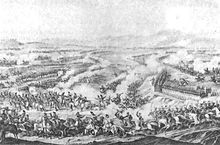Russo-Persian War (1826-1828)
| Russo-Persian War (1826–28) | |||||||||
|---|---|---|---|---|---|---|---|---|---|
| Part of the Russo-Persian Wars | |||||||||
 The Battle of Elisabethpol on 13 September 1826 |
|||||||||
|
|||||||||
| Belligerents | |||||||||
|
|
|
||||||||
| Commanders and leaders | |||||||||
|
|
|
||||||||
| Strength | |||||||||
| 34,000 | 35,000–50,000 | ||||||||
Russian victory
The Russo-Persian War of 1826–28 was the last major military conflict between the Russian and Persian empires.
After the Treaty of Gulistan that concluded the previous Russo-Persian War in 1813, peace reigned in the Caucasus for thirteen years. However, Fath 'Ali Shah, constantly in need of foreign subsidies, relied on the advice of British agents, who pressed him to reconquer the territories lost to Russia and pledged their support for military action. The matter was decided upon in spring 1826, when a bellicose party of Abbas Mirza prevailed in Tehran and the Russian minister, Aleksandr Sergeyevich Menshikov, was placed under house arrest.
The war ended in 1828 following the occupation of Tabriz. The war had even more disastrous results for Persia than the 1804-1813 war, as the ensuing Treaty of Turkmenchay stripped Persia of its last remaining territories in the Caucasus, which comprised all of modern Armenia, the southern remainder of modern Azerbaijan, and modern Igdir in Turkey. Through the Gulistan and Turkmenchay treaties Persia lost all of its territories in the Caucasus to Russia. These territories had once extended throughout most of Transcaucasia and part of the North Caucasus.
The war marked the end of the era of the Russo-Persian Wars, with Russia now being the unquestioned dominant power in the Caucasus. Persia (Iran) was forced to cede swaths of territories that it never regained. The conquered territories spent more than 160 years under Russian domination before establishing their independence, except Dagestan, which is still a Russian possession. In 1991, through the dissolution of the USSR, the modern states of Georgia, Azerbaijan, and Armenia were established from the bulk of the South Caucasus territories that had come under the dominion of Russia by 1828.
...
Wikipedia
